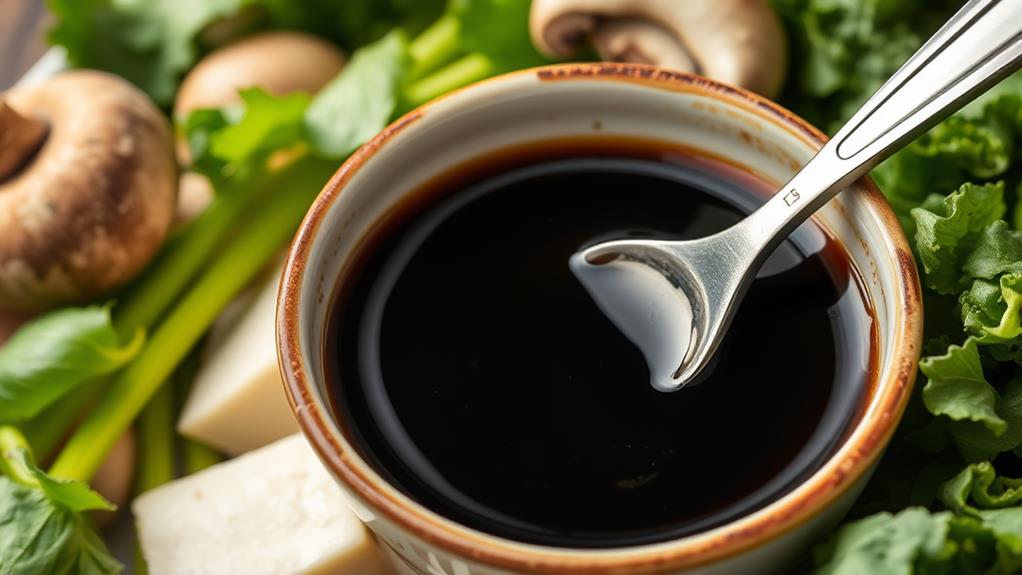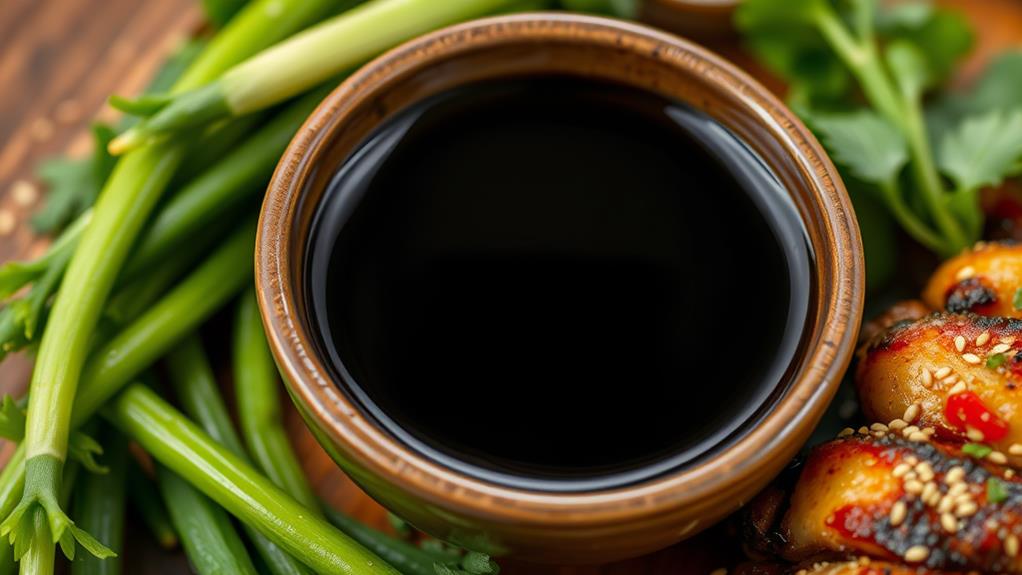Soy sauce is keto-friendly primarily due to its low carbohydrate content, with only about 0.7 to 0.8 grams of carbs per tablespoon. This allows you to enjoy its rich umami flavor without throwing off your carb count. While traditional soy sauce contains gluten, options like tamari offer gluten-free alternatives. Keep in mind the high sodium levels (around 878 milligrams per tablespoon), so moderation is important. Also, check labels to avoid added sugars found in some varieties, which can increase carbs. There's more to discover about soy sauce's benefits and how to use it effectively in your meals.
What Is Soy Sauce?
Soy sauce is a flavorful condiment that hails from China, crafted from fermented soybeans, water, wheat, and salt. This unique combination undergoes a fermentation process, where the soybeans are boiled and then allowed to ferment. This process develops the complex taste that elevates dishes across Asian cuisine, making soy sauce a staple in many kitchens.
With its low carbohydrate content, soy sauce aligns well with dietary preferences for those looking to reduce hunger and cravings, as a keto diet promotes feelings of fullness.
While traditional soy sauce is delicious, it's crucial to recognize that it contains gluten due to the wheat. If you're gluten-sensitive, you might want to opt for gluten-free alternatives like tamari.
When it comes to dietary considerations, soy sauce is low in carbs, with only about 0.8 grams per tablespoon. This makes it a popular choice for those following a keto diet.
Despite being low in carbs, keep in mind that soy sauce is high in sodium, so moderation is key. If you're looking for a soy sauce alternative that's both gluten-free and lower in carbs, consider tamari or coconut aminos. These options can help you stay within your dietary goals while still enjoying that rich, savory flavor you love.
Nutritional Profile of Soy Sauce
When you look at the nutritional profile of soy sauce, you'll find it's low in carbohydrates, with just 0.8 grams per tablespoon, making it a great fit for your keto diet.
Additionally, soy sauce can enhance the flavor of various dishes, including those featuring low-carb meats like pepperoni.
However, keep an eye on sodium levels, as one tablespoon packs around 878 milligrams, which can add up quickly.
Understanding these aspects can help you enjoy soy sauce while staying mindful of your overall intake.
Carbohydrate Content Analysis
For those following a ketogenic diet, understanding the carbohydrate content of soy sauce is essential. Typically, one tablespoon of regular soy sauce contains about 0.8 grams of carbs, making it a low-carb option that's keto friendly soy. This small amount allows you to enjoy the flavor without jeopardizing your carb limit.
However, not all soy sauces are created equal. Dark soy sauces, especially the sweet varieties, can have around 5 grams of net carbs per tablespoon. If you're watching your carb intake closely, it's important to choose wisely.
Low-sodium soy sauce options maintain a similar carbohydrate count, with about 0.8 grams of net carbs per tablespoon, making them another viable choice for keto dieters.
Always read nutrition labels carefully, as some soy sauces may contain added sugars that can greatly increase their carb content. By keeping an eye on these details, you can enjoy soy sauce as part of your ketogenic lifestyle without compromising your dietary goals.
Sodium Levels Impact
While enjoying the savory depth of soy sauce, you should be aware of its high sodium content, which clocks in at approximately 878 milligrams per tablespoon. This level of sodium can be a concern for anyone monitoring their intake, especially if you're following a clean keto diet.
However, the sodium levels in soy sauce can enhance flavor without adding considerable calories or carbohydrates, making it a popular choice for low-carb meals.
If you're on a strict keto diet, you can opt for low-sodium soy sauce varieties. These options allow you to enjoy the rich flavor of soy sauce while reducing your sodium intake. It's important to regularly monitor your sodium consumption, especially if you use soy sauce frequently in your meals, to avoid exceeding daily limits.
Despite its high sodium content, soy sauce generally has a low glycemic response, meaning it won't greatly impact your blood sugar levels. This makes it a fitting choice for those adhering to a low-carb lifestyle.
Just remember to balance your meals and keep an eye on how much soy sauce you're adding to your dishes!
Is Soy Sauce Keto-Friendly?

Is soy sauce a viable option for your keto diet? Absolutely! Soy sauce is a keto-friendly condiment, boasting around 0.7 grams of net carbs per tablespoon. This low carb content makes it suitable for your ketogenic meals when used in moderation.
Just keep in mind that traditional soy sauce is high in sodium—about 879 milligrams per tablespoon—so if you're watching your sodium intake, consider low-sodium versions that still maintain those low carb levels.
Additionally, incorporating low-carb sweeteners like natural sweeteners can enhance the flavor of your dishes without compromising your keto goals. However, be cautious with certain types like dark or sweet soy sauce, as they often contain added sugars that can throw you out of ketosis. Always check the nutrition labels to verify you're picking the right soy sauce for your diet.
If you're looking for alternatives, tamari and coconut aminos can be great options too; they're gluten-free and often lower in carbs, making them another suitable choice for strict keto followers.
While soy sauce is low in calories, about 8.5 calories per tablespoon, moderation is key. With careful selection, you can enjoy soy sauce as a flavorful addition to your keto-friendly meals!
Types of Soy Sauce
When it comes to soy sauce, you'll find a variety of types that cater to different culinary needs and flavor profiles. Understanding these types can enhance your cooking while keeping your keto goals in check. Incorporating keto-friendly fruits like avocados or berries can add delicious flavors and health benefits to your meals alongside soy sauce.
- Light Soy Sauce: This is your go-to for everyday cooking. It's lighter in color and flavor, containing about 6.7 grams of carbohydrates per 100 mL.
- Dark Soy Sauce: Richer in flavor and color, dark soy sauce is ideal for braising dishes. However, it has a higher sugar content, with around 8.0 grams of carbohydrates per 100 mL.
- Tamari: If you're gluten-sensitive, tamari is a great gluten-free option often made from miso paste, offering a similar taste without wheat.
It's important to be aware that sweet soy sauce can have considerably higher sugar levels, making it less suitable for keto diets.
If you want an alternative, consider coconut aminos, which are lower in carbs and gluten-free, with about 1 gram of carbs per serving.
Keto-Friendly Alternatives

Finding keto-friendly alternatives to traditional soy sauce can elevate your meals without derailing your dietary goals. If you're on the keto diet, consider coconut aminos, which contains about 1g of carbs per serving and is gluten-free.
Additionally, you can indulge in delicious desserts like sugar-free keto brownies that complement your savory dishes perfectly. Another great option is tamari, a gluten-free variant that typically has 1-2g of net carbs per tablespoon, giving your dishes a richer flavor.
Liquid aminos also provide a similar taste to soy sauce while being lower in sodium and free from added sugars, making them ideal for your keto needs.
Fish sauce is another contender; pure fish sauce, made from fermented fish and salt, is low in carbs and offers a strong umami flavor.
If you want total control over your carb count, try creating a homemade soy sauce substitute. By using ingredients like broth and spices, you can tailor the flavor to your liking while keeping those carbs in check.
With these soy sauce alternatives, you can enjoy your favorite dishes without compromising your keto diet.
Culinary Uses of Soy Sauce
Enhancing your dishes with soy sauce opens up a world of culinary possibilities. This versatile ingredient not only adds depth of flavor but also keeps your meals low-carb and exciting. Incorporating simple keto snacks alongside soy sauce can further elevate your culinary experience.
You can use soy sauce in various ways to elevate your cooking.
- Marinade for meats: Soy sauce tenderizes and infuses meats with its umami-rich profile, making every bite delicious.
- Drizzle over vegetables: Adding soy sauce to steamed vegetables enhances their natural flavors without bumping up the carb content.
- Savory salad dressings: Incorporate soy sauce into your vinaigrette for a keto-friendly dressing that adds a delightful umami kick.
Don't forget that soy sauce is a fantastic base for stir-fries, allowing you to whip up quick, low-carb dishes packed with flavor.
It also pairs beautifully with seafood, complementing the taste while ensuring you get healthy protein in your meals.
With these culinary uses, soy sauce can truly become a staple in your keto kitchen, transforming ordinary dishes into extraordinary ones.
Whether you're marinating, drizzling, or stirring, soy sauce is your go-to for elevating your low-carb culinary creations.
Health Considerations

Understanding the health considerations of soy sauce is essential for anyone following a keto diet. Soy sauce contains approximately 0.7 grams of net carbs per tablespoon, making it a low-carb option that fits well into your meal plan—if used in moderation.
However, be mindful of its high sodium content, which clocks in at around 878 milligrams per tablespoon. If you're monitoring your salt intake for health reasons, this could pose a concern.
For those with soy allergies, it's important to approach soy sauce with caution, as it's a common allergen. If you want to enjoy the flavor of soy sauce without the high sodium levels, look for low-sodium varieties. These options can help you enhance your dishes while keeping your sodium intake in check.
Additionally, the fermentation process involved in making soy sauce may enhance the bioavailability of beneficial compounds, potentially supporting your gut health.
Conclusion
To sum up, soy sauce can definitely fit into your keto lifestyle, thanks to its low carb content—just about 1 gram of carbs per tablespoon! This makes it a flavorful option for enhancing your dishes without derailing your diet. With various types and keto-friendly alternatives available, you can easily enjoy its rich taste. Just remember to use it in moderation and pay attention to your overall sodium intake. Enjoy your culinary adventures with soy sauce!







